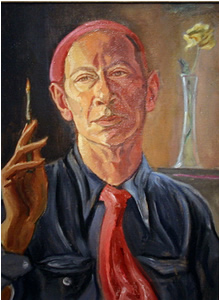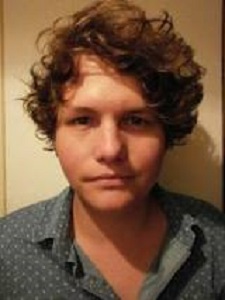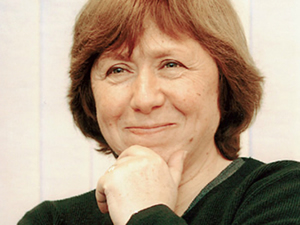De Amerikaanse dichter en schrijver Edward Estlin Cummings werd geboren in Cambridge, Massachusetts op 14 oktober 1894. Zie ook alle tags voor E. E. Cummings op dit blog.
In The Rain-
in the rain-
darkness, the sunset
being sheathed i sit and
think of you
the holy
city which is your face
your little cheeks the streets
of smiles
your eyes half-
thrush
half-angel and your drowsy
lips where float flowers of kiss
and
there is the sweet shy pirouette
your hair
and then
your dancesong
soul. rarely-beloved
a single star is
uttered,and i
think
of you
I Like My Body When It Is With Your
i like my body when it is with your
body. It is so quite new a thing.
Muscles better and nerves more.
i like your body. i like what it does,
i like its hows. i like to feel the spine
of your body and its bones,and the trembling
-firm-smooth ness and which i will
again and again and again
kiss, i like kissing this and that of you,
i like, slowly stroking the,shocking fuzz
of your electric furr,and what-is-it comes
over parting flesh….And eyes big love-crumbs,
and possibly i like the thrill
of under me you so quite new
It Is Funny, You Will Be Dead Some Day
it is funny, you will be dead some day.
By you the mouth hair eyes,and i mean
the unique and nervously obscene
need;it’s funny. They will all be dead
knead of lustfulhunched deeplytoplay
lips and stare the gross fuzzy-pash
—dead—and the dark gold delicately smash….
grass,and the stars,of my shoulder in stead.
It is a funny,thing. And you will be
and i and all the days and nights that matter
knocked by sun moon jabbed jerked with ecstasy
….tremble (not knowing how much better
than me will you like the rain’s face and
the rich improbable hands of the Wind)

Zelfportret, 1958
Lees verder “E. E. Cummings, Péter Nádas, Katha Pollitt, Daniël Rovers, Katherine Mansfield, Margarete Susman, Stefan Żeromski”


